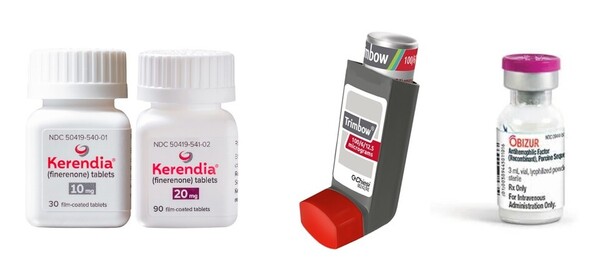Bayer's kidney drug Kerendia (finerenone) has been recognized as adequate for receiving insurance benefits by the Pharmaceutical Reimbursement Evaluation Committee.
Kolon Pharma's three-drug inhaler Trimbow (beclometasone/formoterol/glycopyrronium) and Takeda's hemophilia drug Obizur (susoctocog alpha; porcine factor VIII, genetic recombinant) have passed the drug evaluation panel under the condition that their reimbursements are appropriate when accepting the government's assessment price.
On Thursday, the Health Insurance Review and Assessment Service (HIRA) released the results of the 11th Pharmaceutical Reimbursement Evaluation Committee deliberations.
There were three new reimbursement proposals -- Kerendia, Trimbow, and Obizur.

Kerendia passed the first gateway for reimbursement by winning recognition for its reimbursing appropriateness at the meeting.
In May last year, Kerendia won the nod from the Ministry of Food and Drug Safety to treat chronic kidney disease in patients with type 2 diabetes. As the first non-steroidal mineralocorticoid receptor antagonist (non-steroidal MRA), Kerendia represents a new class of therapeutics targeting inflammation and fibrosis that can lead to permanent kidney damage.
It was Bayer’s first attempt to get reimbursement for Kerendia after winning a marketing license. It is subject to drug price negotiations with the National Health Insurance Service (NHID), which typically takes 60 days, and a review by the Health Insurance Policy Deliberation Committee to get insurance benefits.
Trimbow and Obizur won conditional approvals, meaning they are eligible for reimbursement if the pharmaceutical companies accept the government's proposed valuation amount.
Trimbow is a three-drug inhaler approved for maintenance therapy for patients with asthma and severe chronic obstructive pulmonary disease (COPD). It won MFDS’s nod in September 2019 and made its second attempt at this meeting.
Trimbow received conditional approval at the drug review panel in October last year but failed to get reimbursement because Kolon Pharma refused to accept the government's valuation.
Obizur got the regulator nod this past March to treat acquired hemophilia A. Patients with acquired hemophilia A have normal factor VIII, but neutralizing antibodies that bind to factor VIII interfere with blood clotting, making it difficult for bleeding to stop.
Obizur was produced using genetic recombination technology to remove a portion of factor VIII from pigs that is not required for blood clotting. It temporarily replaces factor VIII, inhibited by neutralizing antibodies, to help hemostasis in people with hemophilia A.
Takeda, which made its first reimbursement attempt since getting approval, will be able to move on to the next stage of drug price negotiations with the NHID if it accepts the government-proposed valuation.
On the agenda for reimbursement expansion at the meeting was the lung cancer drug Leclaza (lazertinib), developed by Yuhan Corps, which passed the drug review committee. Leclaza passed the panel just a month after it passed the Cancer Disease Deliberation Committee in late August.
A competitor of Leclaza, AstraZeneca's Tagrisso (osimertinib), passed the drug review committee in September and was recently ordered to negotiate drug prices with the NHID, and the government can proceed with drug price negotiations by putting Tagrisso and Lexarza on the same lines.
Related articles
- 'Verquvo to drive care transformation for heart failure with repeated exacerbation and hospitalization'
- SGLT-2i Jardiance expands indication to treat chronic kidney disease
- Bayer's Kerendia, treating chronic kidney disease in type-2 diabetes, to get reimbursement starting February
- Bayer Korea, Chong Kun Dang to co-market kidney disease treatment Kerendia
- Bayer's Kerendia marks a paradigm shift in diabetic kidney disease treatment with reimbursement

